In a world of mounting stress, overstimulation, and restless nights, the pursuit of deep, restorative sleep has become both a luxury and a necessity. Simultaneously, as our understanding of brain health expands, more people are seeking natural strategies to support cognitive vitality alongside better rest. At this fascinating intersection of ancient herbal wisdom and modern neuroscience stands an emerging ally: the mushroom drink for sleep. As adaptogenic and nootropic mushrooms gain traction for their ability to soothe the nervous system and enhance mental clarity, a growing number of individuals are turning to mushroom-based elixirs as both a nighttime ritual and a tool for cognitive enhancement. In this comprehensive guide, we explore the best mushroom drinks that support restful sleep and mental rejuvenation, focusing particularly on reishi, the revered mushroom of tranquility.
You may also like: The Ultimate Guide to the Best Nootropic Mushrooms for Memory and Cognitive Enhancement
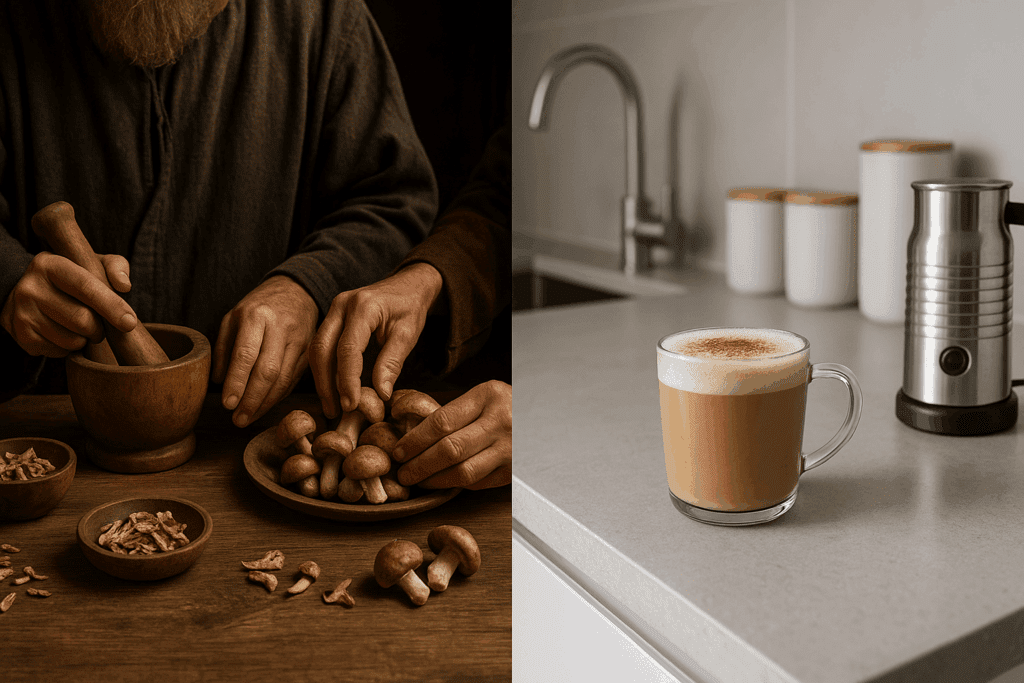
The Rise of Mushroom Beverages: Ancient Roots and Modern Needs
The concept of using mushrooms medicinally stretches back millennia, with traditional Chinese medicine, Ayurvedic practices, and Indigenous healing systems placing great emphasis on fungi’s restorative potential. Reishi (Ganoderma lucidum), lion’s mane (Hericium erinaceus), and cordyceps (Cordyceps militaris) have long been staples in holistic remedies aimed at increasing longevity, energy, immunity, and mental acuity. These historical practices laid the groundwork for today’s surge in mushroom-based beverages—an innovative evolution that delivers time-tested health benefits in a convenient, modern format.
As contemporary consumers increasingly reject synthetic sleep aids and stimulant-laden cognitive enhancers, mushroom drinks offer a compelling alternative. These formulations typically blend medicinal mushroom extracts with calming herbs, functional adaptogens, and soothing flavors like cacao or vanilla. Reishi, often called the “Mushroom of Immortality,” is particularly prized for its sleep-promoting properties. A mushroom drink for sleep doesn’t merely serve as a nightcap; it can be an essential part of a larger wellness strategy that nourishes the brain, balances the nervous system, and restores equilibrium to the body’s circadian rhythms.
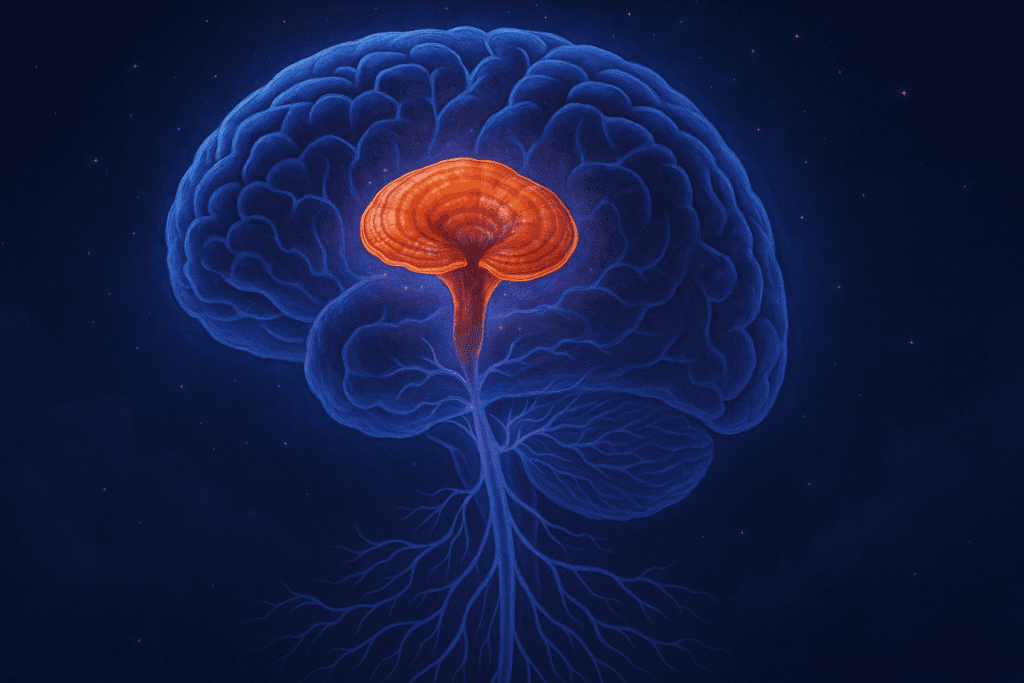
How Reishi Mushroom Supports Sleep and Cognitive Balance
Reishi’s reputation for tranquility is not mere folklore. Scientific studies have begun to validate its traditional use as a sleep aid and stress modulator. One key way reishi promotes better sleep is by influencing the parasympathetic nervous system—the branch responsible for rest and recovery. Compounds such as triterpenoids and polysaccharides within reishi exhibit sedative and anxiolytic properties, helping to reduce mental chatter and calm the body for a restful night.
In addition to its sleep-enhancing effects, reishi supports brain health by combating oxidative stress and neuroinflammation, both of which are implicated in cognitive decline. Through its adaptogenic actions, reishi helps buffer the impact of chronic stress, a major disruptor of both sleep quality and mental clarity. This duality—simultaneously soothing the nervous system while bolstering cognitive resilience—makes reishi a uniquely valuable ingredient in any mushroom drink for sleep and mental recovery.
Emerging research also hints at reishi’s potential to improve REM sleep, the stage associated with memory consolidation and emotional processing. By facilitating longer, uninterrupted sleep cycles and reducing sleep latency (the time it takes to fall asleep), reishi may indirectly contribute to better cognitive function the following day. Understanding how reishi mushroom benefits sleep not only enhances its appeal as a natural remedy but also underscores its broader value in holistic health.
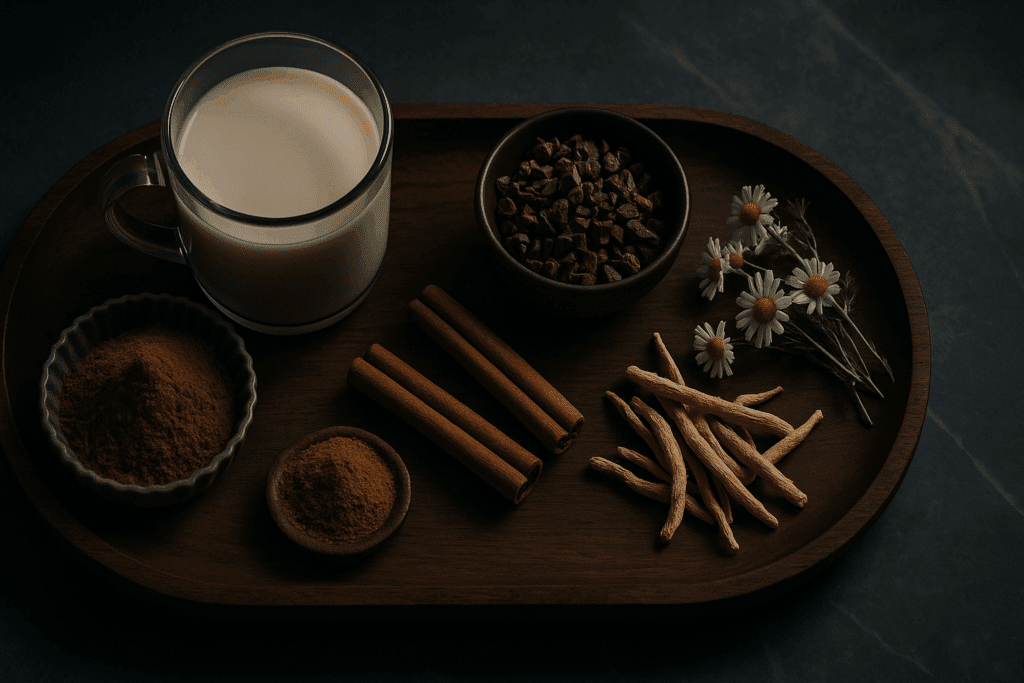
Mushroom Drink for Sleep: The Ideal Ingredients for Nighttime Serenity
Creating an effective mushroom drink for sleep involves more than simply adding powdered reishi to a cup of warm water. The best formulations balance medicinal potency with sensory appeal and synergistic ingredients that enhance both absorption and relaxation. For example, adding ashwagandha, L-theanine, or magnesium can amplify the calming effects of reishi while also addressing the root causes of poor sleep such as high cortisol levels and an overactive mind.
Flavor is another crucial consideration. Earthy and sometimes bitter, reishi can be off-putting to some palates when consumed alone. However, when combined with warm almond milk, cacao, cinnamon, or even chamomile tea, the taste becomes far more inviting. These additions not only improve flavor but also contribute their own calming properties, turning the beverage into a sensory experience that signals the brain it’s time to unwind.
Additionally, many commercially available mushroom drinks include prebiotic fibers or functional fats like coconut milk, which support gut health and improve the bioavailability of fat-soluble compounds. Since the gut-brain axis plays a significant role in sleep regulation and cognitive health, these formulations often work on multiple physiological levels to encourage deep, restorative rest.
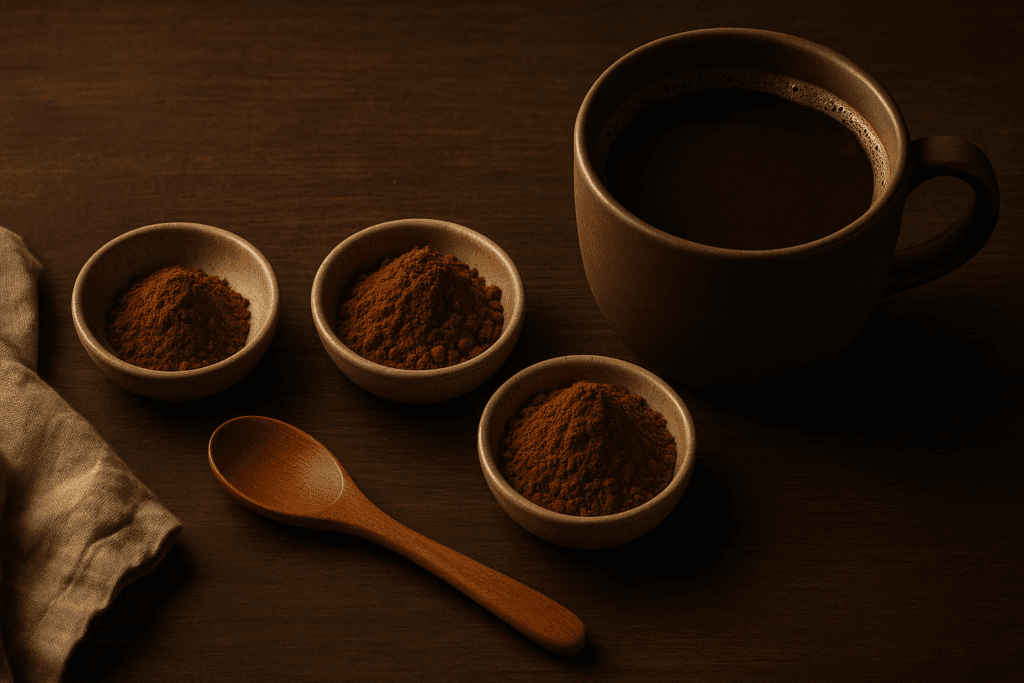
Understanding Reishi Mushroom Dosage for Sleep Effectiveness
A common question among first-time users is how much reishi is needed to experience its sleep benefits without overconsumption. While individual tolerance and sensitivity vary, most experts recommend a reishi mushroom dosage for sleep ranging from 1.5 to 3 grams of extract per serving, taken 30 to 60 minutes before bedtime. This amount has shown effectiveness in supporting relaxation without causing grogginess the next morning.
It’s essential to differentiate between raw mushroom powder and concentrated extracts. The latter, which are often labeled with a 10:1 or similar ratio, are far more potent and require smaller serving sizes. Users should always start with the lowest effective dose and gradually increase as needed, paying attention to how their body responds. As with many natural remedies, consistency is key; the cumulative effects of reishi often become more pronounced after several days or weeks of regular use.
Timing and context also matter. Consuming a mushroom drink for sleep as part of an intentional evening ritual—perhaps paired with meditation, journaling, or gentle stretching—can enhance its impact. Creating these behavioral cues conditions the mind to associate the drink with relaxation, further strengthening its effectiveness over time.
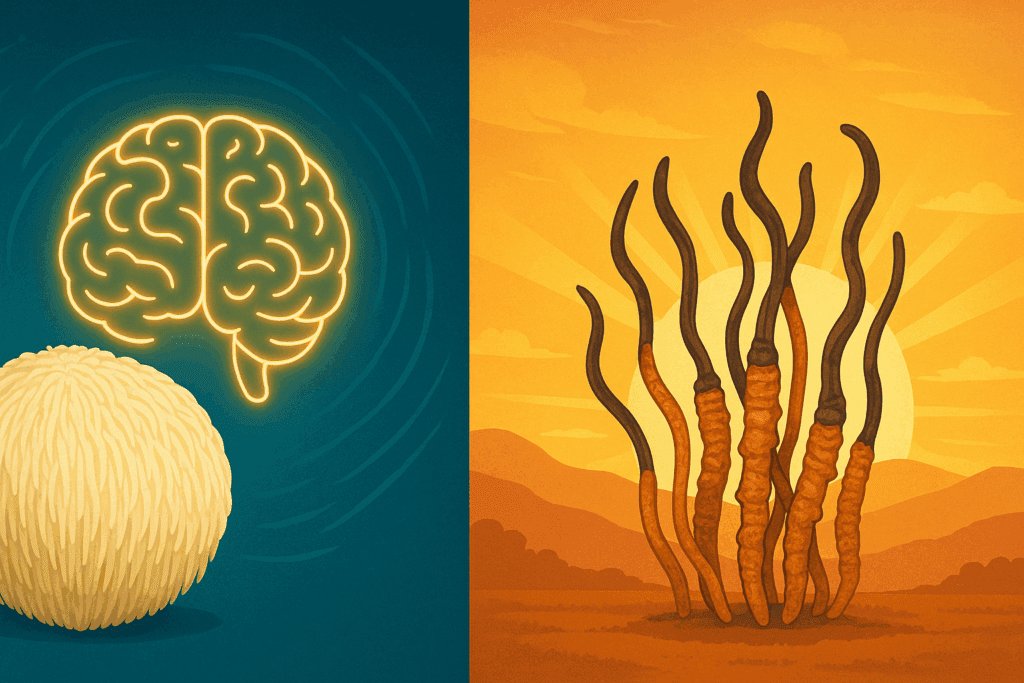
Nootropic Mushrooms Beyond Sleep: Lion’s Mane and Cordyceps
While reishi takes center stage in most mushroom drinks formulated for rest, other fungi play vital roles in supporting cognitive enhancement and daytime performance. Lion’s mane, known for its ability to stimulate nerve growth factor (NGF), has garnered attention for its neuroregenerative properties. Unlike synthetic stimulants, lion’s mane promotes long-term brain health by encouraging neuroplasticity, the brain’s ability to adapt and form new connections.
Cordyceps, on the other hand, is often associated with energy, stamina, and respiratory function. Although it may seem counterintuitive to include an energizing mushroom in a sleep-focused beverage, small amounts of cordyceps can support morning cognition and mental clarity without causing overstimulation. In carefully balanced formulas, these nootropic mushrooms can complement reishi’s calming effects, resulting in a holistic drink that supports a healthy sleep-wake cycle and peak cognitive function throughout the day.
Together, these mushrooms address the full spectrum of mental performance—enhancing clarity and focus during the day while promoting deep rest at night. This synergy makes multi-mushroom drinks especially appealing for individuals seeking a natural approach to both sleep and cognitive enhancement.
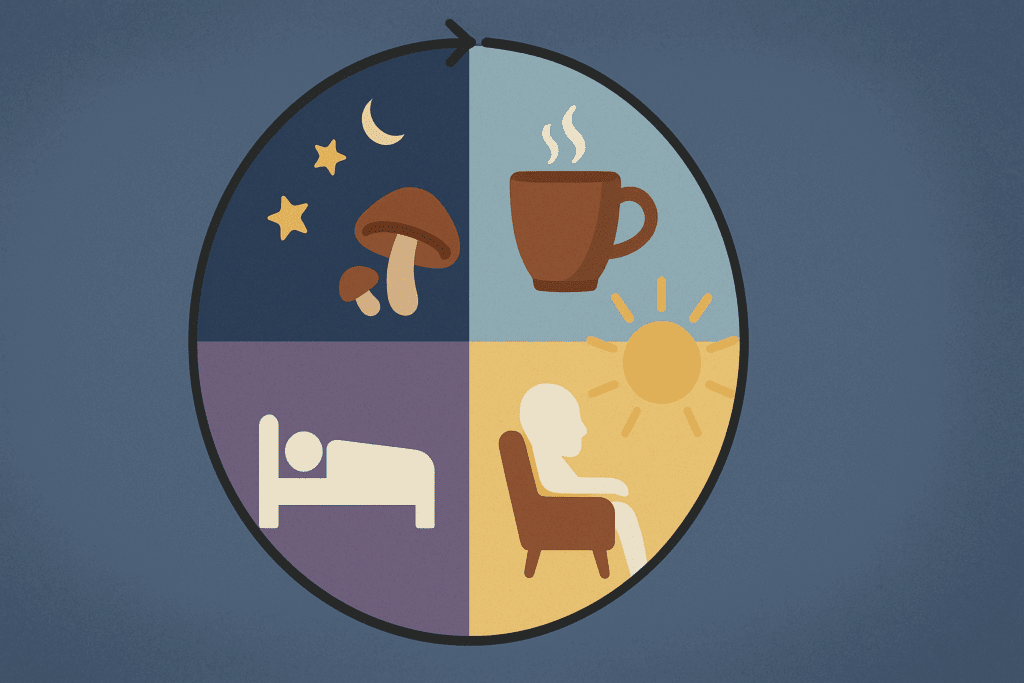
Mushroom Drink for Sleep and the Circadian Connection
Understanding how a mushroom drink for sleep fits into the broader context of circadian health is crucial. The human body operates on a 24-hour internal clock regulated by light exposure, hormonal cycles, and behavioral cues. Disruptions to this rhythm—whether from late-night screen use, irregular meal times, or chronic stress—can impair sleep quality and mental sharpness.
Reishi and other adaptogens help recalibrate the circadian rhythm by lowering cortisol and supporting melatonin production. When taken in the evening, they signal the body that it’s time to transition from the alert, adrenaline-fueled state of day to the restful, reparative mode of night. In this way, a mushroom drink for sleep does more than simply induce drowsiness—it supports the body’s innate capacity to regulate its biological rhythms.
Furthermore, incorporating such drinks into a consistent bedtime routine enhances their effectiveness. The ritual itself becomes a form of cognitive conditioning, helping the brain recognize the association between the drink and sleep. Over time, this can lead to improvements not just in falling asleep, but in staying asleep and waking up feeling refreshed.
Does Reishi Help You Sleep? What Science and Experience Reveal
One of the most frequently asked questions in this space is, “Does reishi help you sleep?” The answer, supported by both empirical evidence and centuries of traditional use, is a resounding yes—with some important nuances. Animal studies have shown that reishi can extend total sleep time and enhance non-REM sleep. Human anecdotal reports echo these findings, with many users describing a gentle onset of sleep and fewer awakenings throughout the night.
However, reishi is not a sedative in the conventional sense. It doesn’t knock you out or induce artificial drowsiness like pharmaceutical sleep aids. Instead, it creates the internal conditions that allow sleep to occur naturally—by calming the mind, reducing physiological arousal, and supporting hormonal balance. This distinction is critical, as it highlights the long-term sustainability of reishi compared to substances that may disrupt sleep architecture or cause dependency.
It’s also worth noting that reishi’s sleep benefits may take several nights to fully manifest. Like many adaptogens, its effects are cumulative rather than immediate. For individuals struggling with chronic insomnia or anxiety-induced sleep disruptions, patience and consistency with reishi can yield profound results.
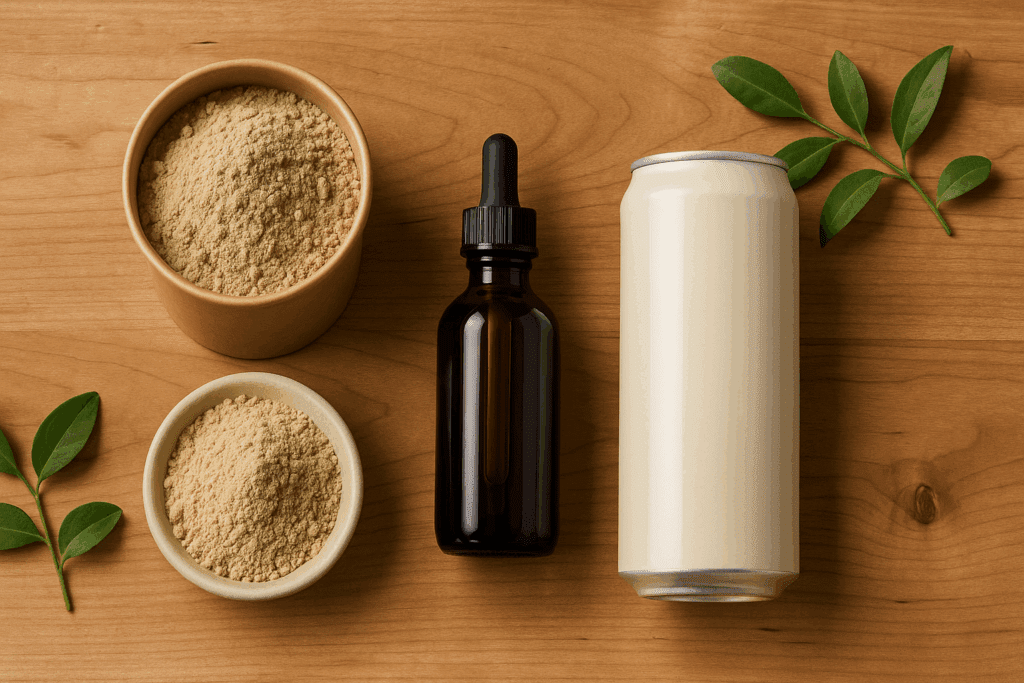
Choosing the Right Mushroom Drink for Sleep: What to Look For
With the market for functional beverages booming, selecting the best mushroom drink for sleep can feel overwhelming. Consumers should begin by scrutinizing ingredient labels. Look for products that contain dual-extracted reishi—processed to retain both water-soluble polysaccharides and alcohol-soluble triterpenoids. This ensures maximum potency and efficacy.
Quality sourcing is another crucial factor. Mushrooms grown on hardwood logs or organic substrates tend to have higher levels of active compounds than those cultivated on grain. Avoid products that list “mycelium on grain” as the primary source, as these often contain more filler than functional compounds.
Beyond the mushroom itself, consider the supporting ingredients. Chamomile, valerian root, lemon balm, and magnesium are common allies in sleep-focused blends. Choose drinks that are free from added sugars, artificial flavors, or unnecessary additives. The best options are those that not only deliver results but also align with a clean, whole-food philosophy.
Price point and dosage transparency also matter. Brands that clearly disclose the exact amount of reishi and other active ingredients demonstrate a commitment to efficacy and consumer education. Finally, consider your own flavor preferences and lifestyle. A powder that mixes easily into a bedtime latte may be ideal for some, while others might prefer ready-to-drink cans or tinctures.
Integrating Mushroom Drinks into a Holistic Sleep Strategy
Drinking a mushroom-based beverage before bed can be a powerful tool, but it should not exist in isolation. To truly harness the potential of reishi and similar fungi, integrate them into a comprehensive approach to sleep hygiene. This includes maintaining consistent sleep and wake times, limiting blue light exposure in the evening, and avoiding heavy meals or stimulants close to bedtime.
Creating a calming evening environment also enhances the effects of a mushroom drink for sleep. Dim lighting, soft music, and quiet activities like reading or meditation can signal the brain to wind down. When combined with the physiological benefits of adaptogenic mushrooms, these practices help reinforce healthy sleep behaviors and improve long-term outcomes.
Daytime habits also influence nighttime sleep quality. Regular physical activity, exposure to natural light, and balanced meals all contribute to a well-regulated circadian rhythm. By aligning these practices with mushroom supplementation, users create a synergistic feedback loop that promotes not only restful sleep but also optimal cognitive function throughout the day.
Reishi Mushroom Benefits Sleep: New Insights into Deep Rest
While much has been said about reishi’s calming effects, recent clinical investigations and user reports have revealed nuanced benefits that go beyond relaxation alone. One of the more intriguing discoveries is reishi’s ability to influence gamma-aminobutyric acid (GABA) pathways in the brain. GABA is a neurotransmitter directly involved in calming neural activity and facilitating sleep. By enhancing GABAergic transmission, reishi helps the brain shift out of a high-alert state and into one that promotes restorative rest. This mechanism may explain why users often report fewer night awakenings and a greater sense of morning refreshment.
Moreover, reishi appears to play a role in regulating circadian rhythms through its influence on melatonin precursors. While it does not contain melatonin itself, reishi supports the body’s natural production by reducing oxidative stress in the pineal gland, where melatonin is synthesized. By preserving cellular health in this vital gland, reishi creates an internal environment conducive to deeper and more regulated sleep cycles. This indirect support makes it an ideal option for those wary of melatonin supplements, which can sometimes lead to hormonal dependency or irregular sleep patterns.
From a holistic perspective, reishi also addresses the emotional and psychological aspects of sleeplessness. Chronic stress, anxiety, and even subconscious worry about not sleeping can create a feedback loop that perpetuates insomnia. Reishi’s adaptogenic nature allows it to modulate the stress response, helping to calm the hypothalamic-pituitary-adrenal (HPA) axis and lower cortisol levels. When cortisol is kept in check during the evening, the body can enter sleep more easily and sustain it longer. This comprehensive action distinguishes reishi as a cornerstone ingredient in any well-formulated mushroom drink for sleep.
Exploring Reishi Mushroom Dosage for Sleep in Functional Beverages
Determining the appropriate reishi mushroom dosage for sleep depends on several variables, including the user’s age, weight, sensitivity to adaptogens, and overall sleep challenges. While the 1.5 to 3 grams per serving benchmark remains a reliable starting point, recent advancements in extraction methods have enabled companies to concentrate these dosages even further. Dual-extraction methods that preserve both beta-glucans and triterpenoids often yield a more potent result at a lower volume, allowing for easier incorporation into smaller servings and tastier formulations.
Some experts recommend microdosing reishi throughout the evening rather than taking a single large dose. For example, sipping on a mushroom drink for sleep over the course of 30 minutes may provide more gradual effects than a quick single dose. This approach mirrors the body’s natural winding-down process and aligns with how herbalists have traditionally used calming teas and tonics. It also offers flexibility for individuals who may wish to combine reishi with other relaxing mushrooms or herbs in the same beverage.
Additionally, consumers should be aware of how reishi interacts with other ingredients in their nighttime routine. When taken alongside magnesium glycinate, L-theanine, or valerian, reishi’s efficacy may be enhanced through synergistic pathways. These combinations can be especially effective for individuals dealing with both anxiety and sleep disruptions. Ultimately, finding the optimal reishi mushroom dosage for sleep requires some experimentation and attentiveness to the body’s feedback, but the payoff is often a deeply revitalized sleep experience that enhances every facet of daily life.
Frequently Asked Questions About Mushroom Drinks for Sleep and Cognitive Recovery
1. How long does it take for a mushroom drink for sleep to start working?
The onset time for a mushroom drink for sleep varies depending on the formulation and the individual’s metabolism. Most users begin to feel relaxed within 30 to 60 minutes of consumption, especially if the drink includes calming adaptogens like reishi and L-theanine. However, long-term benefits often require consistent use over several days or weeks. This is because adaptogenic mushrooms, particularly reishi, work cumulatively to modulate the nervous system and stress response. To accelerate effectiveness, some users combine the drink with pre-bed rituals such as dimming lights or practicing mindfulness, which can further prime the body for rest.
2. Can I take a mushroom drink for sleep alongside other supplements or medications?
While mushroom drinks are generally safe, combining them with other sleep aids or medications should be done cautiously and under medical supervision. Reishi may interact with blood pressure medications, anticoagulants, or immunosuppressants due to its biological activity. If you already take melatonin, sedatives, or antidepressants, introducing a mushroom drink for sleep could potentially enhance or interfere with their effects. However, many herbalists and integrative practitioners find that reishi blends well with magnesium and L-theanine for synergistic benefits. Always consult a healthcare provider before adding any functional supplement to your existing regimen.
3. What is the ideal reishi mushroom dosage for sleep in sensitive individuals?
For those sensitive to supplements or prone to vivid dreams, it is advisable to start with a low reishi mushroom dosage for sleep—as little as 500 mg of a dual-extracted reishi powder or 1 gram of raw powder. Gradually increasing the dose allows the body to acclimate while monitoring for side effects such as dizziness or digestive discomfort. Some users find success with alternate-day dosing, especially if they are prone to overstimulation. Interestingly, microdosing strategies using a diluted mushroom drink for sleep throughout the evening have also shown promise in clinical feedback. This approach aligns better with natural sleep rhythms and allows for sustained relaxation over time.
4. Does reishi help you sleep even if you don’t feel anxious?
Yes, reishi helps improve sleep quality even in the absence of overt anxiety. Its adaptogenic properties extend beyond stress relief, supporting hormonal regulation, immune modulation, and improved oxygen utilization—all of which indirectly promote deeper sleep. For those without stress-related sleep issues, reishi may still enhance rest by supporting parasympathetic nervous system activity and increasing REM cycle duration. Studies have also shown that reishi can reduce nighttime awakenings and support morning alertness. Therefore, even calm individuals can benefit from incorporating reishi into their nighttime routine.
5. How does a mushroom drink for sleep differ from traditional sleep aids?
Unlike traditional sleep aids such as benzodiazepines or over-the-counter antihistamines, a mushroom drink for sleep works by creating balance rather than inducing sedation. Reishi and other functional mushrooms don’t force the body into sleep; they gently modulate biological pathways like cortisol release and neurotransmitter balance to promote natural sleepiness. This results in fewer side effects like grogginess, dependence, or tolerance. Over time, users often find that their sleep becomes more self-regulating, reducing the need for daily supplementation. The adaptogenic and nootropic qualities of these mushrooms also contribute to cognitive wellness, unlike conventional sleep aids.
6. Are there specific times I should drink a reishi-based beverage to optimize results?
Timing is essential when using a reishi-based mushroom drink for sleep. The most effective window tends to be 30 to 90 minutes before bedtime, depending on how quickly your digestive system processes nutrients. For those using a multi-mushroom blend that includes stimulating varieties like cordyceps, it’s best to consume these earlier in the evening to avoid conflicting signals to your circadian rhythm. Some users also benefit from sipping the drink slowly instead of drinking it all at once. This extended exposure can deepen its calming effects and mimic a more gradual wind-down process, especially when paired with evening rituals.
7. Can mushroom drinks support mental health in addition to improving sleep?
Absolutely. Many mushroom drinks are designed not just for rest but also to support mental clarity and emotional resilience. Reishi, for instance, is known to support mood stability by regulating cortisol and inflammatory markers that influence emotional well-being. Lion’s mane, often included in daytime nootropic blends, can also be taken in small amounts in nighttime formulas to promote neural regeneration without overstimulation. Over time, consistent use may contribute to improved emotional regulation, decreased rumination, and increased cognitive flexibility. These benefits make mushroom drinks an attractive option for those looking to balance mind and body.
8. What should I look for when choosing a high-quality mushroom drink for sleep?
When selecting a mushroom drink for sleep, look for dual-extracted reishi to ensure full-spectrum efficacy of both polysaccharides and triterpenoids. Products should clearly label the reishi mushroom dosage for sleep and indicate whether the mushrooms are fruiting body or mycelium—the former is generally more potent. Avoid drinks with high levels of sugar or synthetic additives that may counteract the calming effects of the mushrooms. Instead, seek beverages that combine reishi with synergistic herbs like valerian, lemon balm, or passionflower. Lastly, verify the brand’s sourcing and lab testing practices to ensure purity, especially if you plan to make the drink a regular part of your wellness routine.
9. Is there a risk of developing tolerance to reishi mushroom when used daily for sleep?
Unlike synthetic sleep aids, reishi is not known to cause tolerance or dependence when used consistently. In fact, many users report cumulative benefits with daily intake, particularly with a stable reishi mushroom dosage for sleep over several weeks. However, cycling your intake periodically—such as taking breaks on weekends or alternating with other adaptogens—can help prevent receptor fatigue and keep the nervous system responsive. Long-term users sometimes also switch between different delivery forms, such as teas, powders, and tinctures, to maintain efficacy. As always, it’s wise to monitor your body’s signals and adjust your regimen based on sleep quality and overall well-being.
10. Why is a mushroom drink for sleep especially effective for people with disrupted circadian rhythms?
People with irregular schedules—such as shift workers, travelers, or new parents—often struggle with misaligned circadian rhythms. A mushroom drink for sleep can serve as a nightly anchor, providing physiological cues that help realign internal clocks. Reishi contributes to this realignment by lowering nighttime cortisol, which often spikes in those with disrupted sleep cycles. Over time, consistent use of such drinks at the same time each night trains the body to anticipate rest, improving melatonin production and reinforcing healthy sleep architecture. This ritual-based approach is particularly powerful because it pairs external structure with internal modulation, addressing both behavioral and biological aspects of sleep dysregulation.
Final Thoughts: The Synergy Between Sleep, Cognition, and Functional Fungi
The connection between sleep and cognitive performance is undeniable. Quality sleep enhances memory consolidation, emotional regulation, decision-making, and creative problem-solving. Conversely, even short-term sleep deprivation can impair concentration, slow reaction times, and increase mental fatigue. Against this backdrop, the value of a mushroom drink for sleep becomes clear: it’s not merely a tool for falling asleep—it’s a strategic investment in long-term brain health.
Reishi, with its calming and neuroprotective properties, stands as a leading figure in this arena. When paired with other nootropic mushrooms like lion’s mane and cordyceps, it forms a comprehensive solution that addresses both nighttime restoration and daytime excellence. With careful formulation, consistent use, and integration into a broader lifestyle approach, mushroom drinks offer a transformative pathway to better sleep and sharper cognition.
As the wellness landscape continues to evolve, the ancient wisdom of fungi is meeting the modern demand for safe, effective, and holistic health solutions. By understanding how reishi mushroom benefits sleep and making informed choices about ingredients and dosage, consumers can tap into the full potential of these extraordinary organisms. Whether you’re looking to recover from burnout, sharpen your focus, or simply enjoy more restful nights, the right mushroom drink can be a powerful ally on the journey to well-being.
